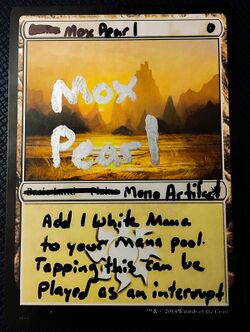Proxy
| Proxy | |
|---|---|
| Card Treatment | |
| Only used in casual play |
A proxy is a card is a non-tournament-legal substitution for a card for another Magic card in casual play.[1] In a tournament setting, it is a replacement that has been approved by a judge.
Casual use
Vintage tournaments often allow unsanctioned use of 10 proxies to keep costs down. Having the original Power 9 in a deck can be well over $24,000.
For instance, the chances that a player owns a Black Lotus are slim, but if they have their opponent's permission, the player and opponent could play with the understanding that a different card represents a Black Lotus. A proxy may be a card with different text written over it, a piece of paper with the text written on it taped over it, with the text paper inserted into its card protector over it, or anything else the players agree upon.
Another use of proxy cards is to protect high-value cards. For instance when you do own a Black Lotus or perhaps a foil Jace, The Mind Sculptor, you could put a proxy card of it in your deck while having the actual card in a special protector on the side, to prove that you own the card. However, when no proxy cards are allowed in the format you're playing, be ready to have your deck inspected to check if proxied cards equal the authentic cards you own.
Playtest use and counterfeits
Some people print out cards from sources like Scryfall and use these as proxy cards for playtesting. It is also an option to purchase playtest cards/proxies meant for casual play or LGS games directly online using websites like ProxyKing, PrintingProxies, or similar. Some of these "proxy" cards are so professionally made that they can pass as real Magic cards to the untrained eye, and are therefore effectively counterfeits. The production of these cards, for sale, is of course illegal. It should be noted, however, that the reproduction of Magic cards for personal use is not illegal under Fair Use laws.
Wizards of the Coast has no desire to police playtest cards made for personal, non-commercial use, even if that usage takes place in a store.[2] However, cards used in DCI-sanctioned events must be authentic Magic cards.
Tournament use
In sanctioned tournaments like Grand Prixes if a certain card suffered damage beyond what is suitable for competition, the Head Judge of the event has the right to issue a proxy card replacing the damaged card in the deck for that event. Players must also keep the respective damaged card and show it to the opponent if necessary (like setting aside when the card comes into play) if a proxy card replaced damaged cards.
From the Tournament Rules (May 13, 2024—Outlaws of Thunder Junction)
- 3.4 Proxy Cards
A proxy card is used during competition to represent an otherwise legal Magic card or substitute card that can no longer be included in a deck without the deck being marked. For a proxy to be issued, the card it is replacing must meet at least one of the following criteria:
*The card has been accidentally damaged or excessively worn in the current tournament, including damaged or misprinted Limited product. Proxies are not allowed as substitutes for cards that their owner has damaged intentionally or through negligence.
*The card is a foil card for which no non-foil printing exists.
Players may not create their own proxies; they may only be created by the Head Judge who has sole discretion as to whether the creation of a proxy is appropriate. When a judge creates a proxy, it is included in the player’s deck and must be denoted as a proxy in a clear and conspicuous manner. The original card is kept nearby during the match and replaces the proxy while in a public zone as long as it is recognizable. A proxy is valid only for the duration of the tournament in which it was originally issued.
References
- ↑ Aaron Forsythe (March 19, 2004). "A-Proxy-Mation". magicthegathering.com. Wizards of the Coast. Archived from the original on 2020-11-08.
- ↑ Elaine Chase (January 14, 2016). "On Proxies, Policy, and Communication". magicthegathering.com. Wizards of the Coast. Archived from the original on 2019-03-21.
